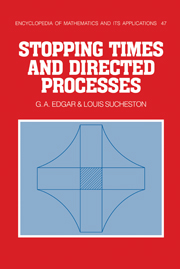8 - Pointwise ergodic theorems
Published online by Cambridge University Press: 21 January 2010
Summary
In this chapter, we will prove some of the pointwise convergence theorems from ergodic theory. The main result of this chapter is the superadditive ratio ergodic theorem. It implies the Chacon-Ornstein theorem, the Kingman subadditive ergodic theorem, and, for positive operators, the Dunford-Schwartz theorem and Chacon's ergodic theorem involving “admissible sequences.” We consider positive linear contractions T of L1.
Our plan is as follows. We first prove weak maximal inequalities, from which we obtain the Hopf decomposition of the space Ω into the conservative part C and the dissipative part D (8.3.1). Assuming T conservative (that is, Ω = C, we prove the Chacon-Ornstein theorem (8.5.4), i.e., the convergence to a finite limit of the ratio of sums of iterates of T applied to functions f and g The limit is identified in terms of f, g, and the σ-algebra C of absorbing sets. The superadditive operator ergodic theorem is proved in the conservative case (8.4.6). It is then observed that the total contribution of Ω to C is a superadditive process with respect to the conservative operator Tc induced by T on C. Since the behavior of the ergodic ratio on the dissipative part D is obvious, the Chacon-Ornstein theorem (8.6.10) and, more generally, the superadditive ratio theorem (8.6.7) will follow on Ω This affords considerable economy of argument, since the direct study of the contribution of D to C is not obvious even for additive processes.
The superadditive theory (or, equivalently, the subadditive theory) is mostly known for its applications, but in fact the notion of a superadditive process is shown to shed light on the earlier additive theory of L1 operators.
Information
- Type
- Chapter
- Information
- Stopping Times and Directed Processes , pp. 344 - 381Publisher: Cambridge University PressPrint publication year: 1992
